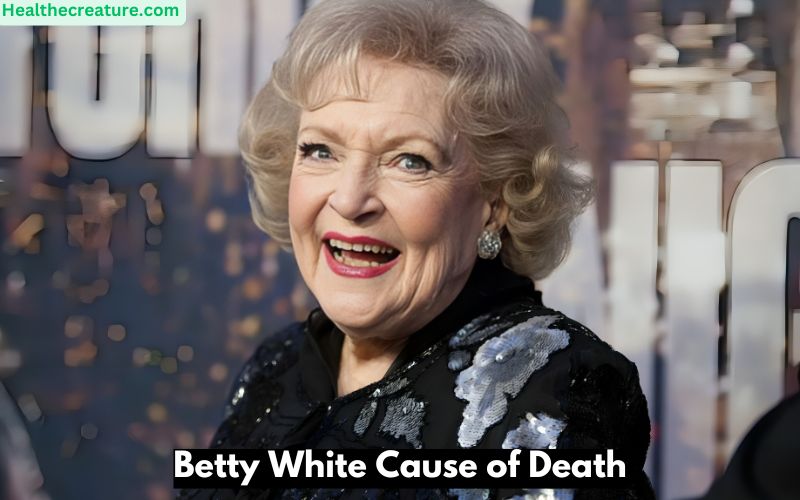Betty White, the beloved actress and comedian whose legendary career spanned over eight decades, passed away on December 31, 2021, at the age of 99. As news of her death broke, an outpouring of grief and tributes flooded social media, marking the end of an era for fans who adored her work, her humor, and her kind spirit. White’s death came just weeks before her 100th birthday, which had already been widely anticipated and celebrated by fans and media alike.
In this article, we explore the official cause of Betty White’s death, the impact of her passing, her illustrious career, and her lasting legacy in Hollywood and beyond.
The Official Cause of Death
The official cause of Betty White’s death was determined to be a cerebrovascular accident, more commonly known as a stroke. According to her death certificate, which was obtained shortly after her passing, White suffered the stroke approximately six days prior to her death on December 31. While she had reportedly been in relatively good health for her age, the stroke ultimately proved fatal.
A cerebrovascular accident occurs when blood flow to a part of the brain is interrupted, either due to a blockage (ischemic stroke) or bleeding (hemorrhagic stroke). Such incidents are not uncommon in elderly individuals, especially those in their late 90s. Although strokes can sometimes be treated and managed with quick medical intervention, recovery becomes significantly more difficult in advanced age.
White’s longtime agent and close friend, Jeff Witjas, released a statement soon after her passing, confirming that she had died peacefully at her home in the Brentwood neighborhood of Los Angeles. Witjas was quick to clarify that White’s death was due to natural causes, dispelling some unfounded rumors that had begun circulating online regarding her health.
“Betty died peacefully in her sleep at her home. People are saying her death was related to the COVID vaccine, but that is absolutely not true. She passed from natural causes.”
The misinformation surrounding her cause of death highlights how rumors can spread during moments of public mourning, underscoring the need for accurate and respectful reporting when it comes to beloved figures like Betty White.
A Nation Mourns: Public Reaction to Her Death
Betty White’s passing struck a deep emotional chord with fans, fellow celebrities, and friends across the globe. She was often referred to as “America’s Sweetheart” and the “First Lady of Television” for her immense contributions to entertainment. White’s wit, warmth, and unwavering optimism resonated with audiences of all ages, making her a beloved figure for multiple generations.
Social Media Tributes
The moment news of her death broke, tributes began pouring in on social media platforms. Celebrities, comedians, and fans alike shared heartfelt messages celebrating her life and legacy.
Comedian Ryan Reynolds, who had developed a humorous, playful banter with White over the years, expressed his grief on Twitter:
“The world looks different now. She was great at defying expectations. She managed to grow very old and somehow, not old enough. We’ll miss you, Betty. Now you know the secret.”
Sandra Bullock, who co-starred with White in The Proposal, spoke of the actress’s kindness and sharp sense of humor:
“I don’t drink vodka… but I’ll have one tonight, on ice, with a slice of lemon, with a hot dog on the other side, and just be OK being sad. I’ll miss you, Betty.”
Countless others, from actors to television hosts to political figures, shared their condolences and memories of White. The overwhelming sense of loss demonstrated just how deeply ingrained Betty White was in American culture.
The Fans’ Response
Fans organized online campaigns to celebrate her life. The hashtag #BettyWhiteChallenge went viral on Twitter, encouraging people to donate to animal shelters and rescue organizations in her honor—a nod to White’s lifelong advocacy for animal welfare. Thousands participated, raising substantial funds for causes she held dear.
In addition, her upcoming 100th birthday, which was to be celebrated on January 17, 2022, became a posthumous event of remembrance and tribute. Major networks aired Betty White’s classic shows and interviews, giving audiences a chance to relive her greatest moments.
Betty White’s Career: A Trailblazer in Television
To fully appreciate the magnitude of Betty White’s death, it is essential to understand the breadth of her career and how she broke barriers in the entertainment industry.
Early Beginnings
Born on January 17, 1922, in Oak Park, Illinois, Betty White began her career in radio and later transitioned to television. She made her mark as a pioneer during television’s early days in the 1950s. White was one of the first women to produce a sitcom, “Life with Elizabeth” (1953-1955), which earned her significant recognition as a producer and performer.
Golden Moments: The Mary Tyler Moore Show and The Golden Girls
White gained national fame playing the sharp-witted Sue Ann Nivens on The Mary Tyler Moore Show (1973-1977). Her portrayal of the sweet yet mischievous “Happy Homemaker” earned her two Emmy Awards and cemented her reputation as a comedic powerhouse.
However, it was her role as the lovable and naive Rose Nylund on The Golden Girls (1985-1992) that solidified Betty White as a pop-culture icon. Alongside Bea Arthur, Rue McClanahan, and Estelle Getty, White brought laughter, charm, and emotional depth to the groundbreaking sitcom, which remains cherished by fans to this day.
A Resurgent Career in Her Later Years
Betty White enjoyed a remarkable career resurgence in her later years, proving her timeless appeal. From hosting Saturday Night Live in 2010 (after a fan-driven Facebook campaign) to starring in TV Land’s Hot in Cleveland, White consistently delighted audiences with her humor and irreverence.
Her guest appearances on shows like Community, The Simpsons, and Boston Legal further demonstrated her comedic versatility. At an age when most actors have long retired, White remained active, relevant, and in demand.
Betty White’s Philanthropy and Advocacy
While Betty White was best known for her work in television, her passion for animal welfare was a defining aspect of her life. She worked tirelessly to advocate for the humane treatment of animals, partnering with organizations such as the Los Angeles Zoo and the Morris Animal Foundation.
White was vocal about her love for animals, often saying that she preferred their company to people. Her legacy as an advocate remains a significant part of her lasting impact.
A Legacy That Will Never Fade
Betty White’s death marked the end of a remarkable life, but her legacy continues to shine brightly. Her humor, resilience, and kindness left an indelible mark on Hollywood, fans, and the entertainment industry as a whole.
The Enduring Impact of Betty White
White’s ability to connect with people across generations made her a unique and beloved figure. Whether it was her comedic timing, her infectious positivity, or her authenticity, Betty White’s influence transcended generations.
Her timeless performances continue to bring joy to audiences, and her philanthropic work ensures that her compassion for animals will carry on. Betty White’s career serves as an inspiration for aspiring actors, comedians, and women in the entertainment industry. Her contributions to television—as both a performer and a trailblazer—are unparalleled.
See Also: Lil Loaded Cause of Death
FAQs
What was Betty White’s cause of death?
Betty White passed away on December 31, 2021, at the age of 99. Her death was attributed to a stroke that occurred six days prior, as confirmed by her death certificate.
Was Betty White’s death related to COVID-19 or a vaccine?
No, Betty White’s death was not related to COVID-19 or any vaccines. Rumors about her receiving a booster shot before her death were false, and her representatives clarified that her passing was due to natural causes.
What is a stroke, and how does it lead to death?
A stroke occurs when blood flow to the brain is disrupted, leading to brain damage. Depending on the severity, it can cause loss of function or become fatal. In Betty White’s case, complications from the stroke led to her passing.
How old was Betty White at the time of her death?
Betty White was 99 years old, just weeks away from celebrating her 100th birthday on January 17, 2022.
Did Betty White have any underlying health conditions before her death?
Betty White lived a remarkably healthy life for her age. While specific underlying conditions have not been publicly detailed, her cause of death was linked directly to the stroke she suffered.
Conclusion
Betty White’s death on December 31, 2021, due to a stroke, marked the passing of a cultural icon whose career and life were nothing short of extraordinary. Her ability to bring laughter, joy, and hope to millions will forever be celebrated.
Though the world mourned her loss, Betty White’s legacy remains eternal. She leaves behind a body of work that continues to entertain, inspire, and uplift generations to come. As fans reflect on her remarkable life, her humor, warmth, and love for animals will remain part of the public memory.
In the words of Betty White herself:
“It’s your outlook on life that counts. If you take yourself lightly and don’t take yourself too seriously, pretty soon you can find the humor in our everyday lives.”
Betty White embodied that philosophy to the fullest, and it is through her laughter and light that she will continue to live on in the hearts of millions around the world.


